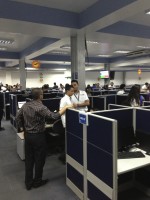
Guatemala Overview
- Largest population in Central American Region (over 13.5 million)
- Close proximity to the US due to its location in the northern part of Central America
- Due to human resource availability, operations can scale significantly
- GDP is US$ 67.8 billion, and currency risk rating of the quetzal is BBB – by Standard and Poor’s.
- Ranked 100 out of 183 countries in the World Bank’s Ease of Doing Business Index 2010; and 91 out of 178 countries in Transparency International’s 2010 Corruption Perceptions Index
- Same time zone as US, and air travel time to Guatemala is approximately 3 hours
- Workforce of 4.1 million, with 70% of the population below the age of 30.
Labor pool
- Largest student numbers in Central America with 170,000 students enrolled in ten universities
- Students are very Americanized – No need for cultural immersion programs when they’re hired
- Heavy flow of people back and forth from the US – People very in touch with North American culture
- Approximately 25,000 Guatemalans in the US lose their visas and return home every year
- English proficiency is strong, plentiful and growing in terms of available English resources due to various government, private and business organizations’ impact on schooling and eduction to serve the industry
- Spanish-based voice services quality are deemed among the best due to a neutral Spanish accent of Guatemalan workers that can be used to service other Hispanic countries and US Hispanic markets
Golden Gate BPO – Guatemala City

Front View of 3 Floor Building

New Applicants at Reception

Admin and IT Programmers

Call Center Floor

Call Center Floor

Call Center Floor

Employee Cafes

IT Room

Employee Recreation Area
Compensation Relative to Central American Competition
- Lower wage rates relative to its Central American competition
- With salaries in Costa Rica continuing to rise and an increasing saturated labor market in Panama, call centers in Guatemala are more attractive for cost savings
- A bilingual call center rep earns approximately $500-600 per month, excluding benefits, while a non-bilingual agent’s wage could be as low as $300-400
- The entry-level IT programmer’s salary is around $700-800 per month
- Employees are obliged to contribute 10.67% of the annual wage as social security, and also pay a 13th month wage, common in many countries in the Latin America Caribbean (LACAR) region
Infrastructure
- Strength of Guatemala telecommunications networks
- Country privatized telecommunications in 1996, as well as the IT and information service providers in the country
- Central America’s most open regulatory frameworks, a fast growing telecom sector, and strong infrastructure due to both local and foreign competition
- With access to an ocean on either side, Guatemala ensures 99% redundancy in connections to both Pacific and Atlantic fiber optic cables
- Guatemalans are very connected – there are 1.2-1.5 cell phones for every person in Guatemala City, and social media is huge
- Guatemala has the lowest mobile phone rates in Latin America




